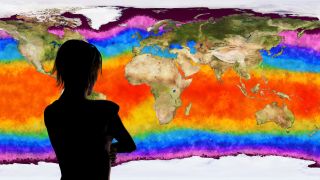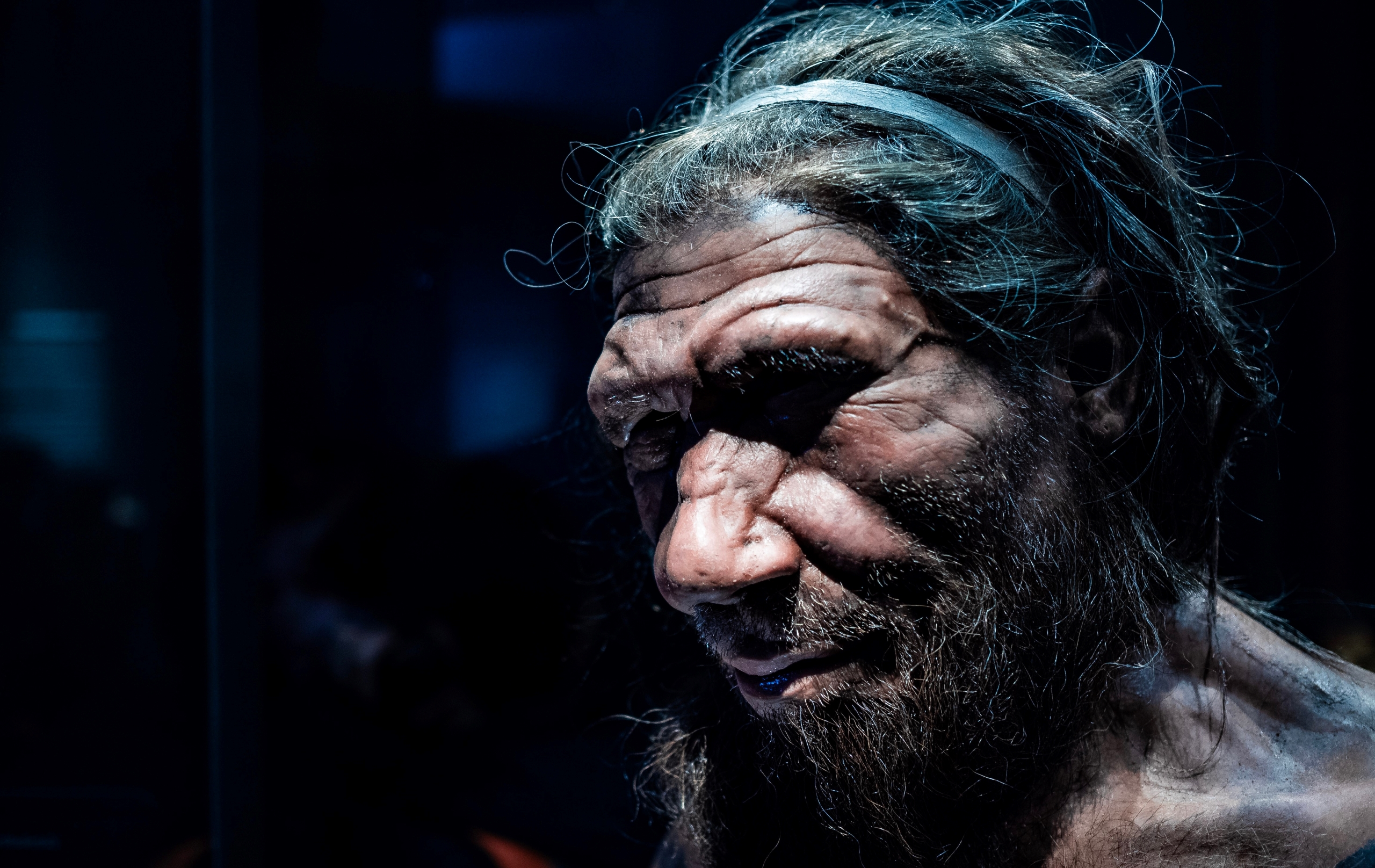How Long Until Climate Change Kill Us
Could climatic change make humans go extinct?

The impacts of climate change are here with soaring temperatures, stronger hurricanes, intensified floods and a longer and more than severe wildfire season. Scientists warn that ignoring climate modify volition yield "untold suffering" for humanity. But if things are going to get that much worse, could climate change make humans go extinct?
Scientists predict a range of devastating scenarios if climate change is non kept under control, but if nosotros just consider the directly impacts, then in that location'south some good news; information technology'due south unlikely to cause our mass extinction.
"There is no show of climate change scenarios that would render human beings extinct," Michael Mann, a distinguished professor of atmospheric science at Penn State and author of "The New Climate War: The Fight to Take Back Our Planet" (PublicAffairs, 2021), told Alive Science in an e-mail.
However, it's possible that climate alter will still threaten the lives of hundreds of millions of people, such as by leading to food and h2o scarcity, which has the potential to trigger a societal collapse and prepare the stage for global conflict, enquiry finds.
Related: Could nosotros ever pull enough carbon out of the atmosphere to stop climate change?
Too hot to handle?
Humans are increasing the corporeality of greenhouse gases, such as carbon dioxide and methane, in the atmosphere through the burning of fossil fuels and other activities. These gases trap and concord heat from the sunday, causing global temperatures to ascent and the climate to change much faster than it otherwise would, putting humanity on a dangerous path.
A runaway greenhouse consequence is probably the only way climate change impacts could directly crusade human extinction, co-ordinate to Luke Kemp, a research associate at the Centre for the Study of Existential Risk at the University of Cambridge in the United kingdom. This effect happens when a planet is defenseless in an unstoppable, positive feedback loop of warming and absorbs more than heat than it loses, until the planet's oceans evaporate and it tin no longer sustain life.
Fortunately, the runaway greenhouse effect is not a plausible climatic change scenario on Earth. For the outcome to occur, a planet needs carbon dioxide levels of a couple of thousand parts per meg (Globe has a little over 400 parts per million) or a huge release of methyl hydride, and there isn't evidence for that at this fourth dimension, Brian Kahn, a research scientist at NASA'south Jet Propulsion Laboratory, told NASA in 2018.
Venus has the runaway greenhouse effect, but information technology is much closer to the sunday and has a much thicker, carbon dioxide-rich atmosphere that traps more heat than Earth'southward, Live Science previously reported. The scientific discipline doesn't support the notion of runaway warming scenarios, although climate doomists often make such claims, Mann said. "There's no reason to exaggerate the climate threat. The truth is bad plenty, and reason enough to take dramatic action."

According to Isle of mann, a global temperature increment of 5.4 degrees Fahrenheit (3 degrees Celsius) or more could lead to a collapse of our societal infrastructure and massive unrest and conflict, which, in turn, could pb to a future that resembles some Hollywood dystopian films.
One mode climate change could trigger a societal collapse is by creating food insecurity. Warming the planet has a range of negative impacts on nutrient production, including increasing the water deficit and thereby reducing food harvests, Live Science previously reported. Food production losses can increment human deaths and drive economical loss and socio-political instability, amongst other factors, that may trigger a breakdown of our institutions and increment the risk of a societal collapse, according to a study published Feb. 21 in the journal Climatic Change.
Related: Has the Earth ever been this hot before?
Past extinctions and collapses
Kemp studies previous civilization collapses and the gamble of climate change. Extinctions and catastrophes almost always involve multiple factors, he said, but he thinks if humans were to go extinct, climatic change would likely be the main culprit.
"If I'thou to say, what do I retrieve is the biggest contributor to the potential for homo extinction going towards the future? Then climatic change, no doubt," Kemp told Live Science.
All of the major mass-extinction events in Earth's history accept involved some kind of climatic change, co-ordinate to Kemp. These events include cooling during the Ordovician-Silurian extinction about 440 million years agone that wiped out 85% of species, and warming during the Triassic-Jurassic extinction about 200 million years agone that killed eighty% of species, Live Science previously reported. And more recently, climate change afflicted the fate of early homo relatives.
While Homo sapiens are obviously not extinct, "we do have a track record of other hominid species going extinct, such as Neanderthals," Kemp said. "And in each of these cases, it appears that once again, climate change plays some kind of part."
Scientists don't know why Neanderthals went extinct about forty,000 years ago, simply climatic fluctuations seem to have broken their population upward into smaller, fragmented groups, and severe changes in temperature afflicted the plants and animals they relied on for food, co-ordinate to the Natural History Museum in London. Nutrient loss, driven by climate change, may have also led to a tiny drop in Neanderthal fertility rates, contributing to their extinction, Alive Scientific discipline previously reported.

Climate modify has as well played a function in the collapse of past human being civilizations. A 300-year-long drought, for example, contributed to the downfall of ancient Hellenic republic about iii,200 years agone. But Neanderthals disappearing and civilizations collapsing do not equal homo extinction. After all, humans accept survived climate fluctuations in the past and currently live all over the world despite the rise and fall of numerous civilizations.
Homo sapiens have proven themselves to be highly adaptable and able to cope with many unlike climates, exist they hot, cold, dry or moisture. Nosotros tin apply resources from many different plants and animals and share those resource, forth with information, to assist us survive in a changing world, according to the Smithsonian's National Museum of Natural History.
Related: How would just two degrees of warming alter the planet?
Today, we live in a global, interconnected civilization, but in that location's reason to believe our species could survive its collapse. A study published on July 21 in the journal Sustainability identified countries well-nigh likely to survive a global societal collapse and maintain their complex way of life. Five island countries, including New Zealand and Republic of ireland, were called equally they could remain habitable through agriculture, thanks to their relatively absurd temperatures, low atmospheric condition variability and other factors that make them more resilient to climate change.
New Zealand would be expected to hold up the best with other favorable conditions, including a low population, large amounts of good quality agricultural state and reliable, domestic energy. Then, fifty-fifty if climate change triggers a global civilization collapse, humans will likely exist able to keep going, at least in some areas.
Turning on ourselves
The last scenario to consider is climate-driven conflict. Kemp explained that in the future, a scarcity of resource that diminish because of climate change could potentially create conditions for wars that threaten humanity. "There's reasons to exist concerned that as water resources dry upwards and scarcity becomes worse, and the general conditions of living today go much, much worse, then suddenly, the threat of potential nuclear war becomes much college," Kemp said.
Put some other fashion, climate change impacts might non directly cause humans to go extinct, but information technology could lead to events that seriously endanger hundreds of millions, if not billions, of lives. A 2019 study published in the journal Science Advances found that a nuclear conflict between just India and Pakistan, with a small fraction of the world's nuclear weapons, could impale l million to 125 million people in those two countries lone. Nuclear war would also modify the climate, such every bit through temperature drops as burning cities fill the atmosphere with fume, threatening food product worldwide and potentially causing mass starvation.
What'south next?
While avoiding complete extinction doesn't sound like much of a climate alter silver lining, there is reason for promise. Experts say it isn't besides belatedly to avoid the worst-instance scenarios with pregnant cuts to greenhouse gas emissions.
"It is up to us," Mann said. "If we fail to reduce carbon emissions substantially in the decade alee, nosotros are probable committed to a worsening of already unsafe farthermost atmospheric condition events, inundation of coastlines around the earth due to melting water ice and rising sea level, more pressure on limited resource as a growing global population competes for less nutrient, water and space due to climate change impacts. If we deed boldly now, nosotros can avoid the worst impacts."
Originally published on Live Scientific discipline.
Source: https://www.livescience.com/climate-change-humans-extinct.html
Posted by: pintodeshe1976.blogspot.com


0 Response to "How Long Until Climate Change Kill Us"
Post a Comment